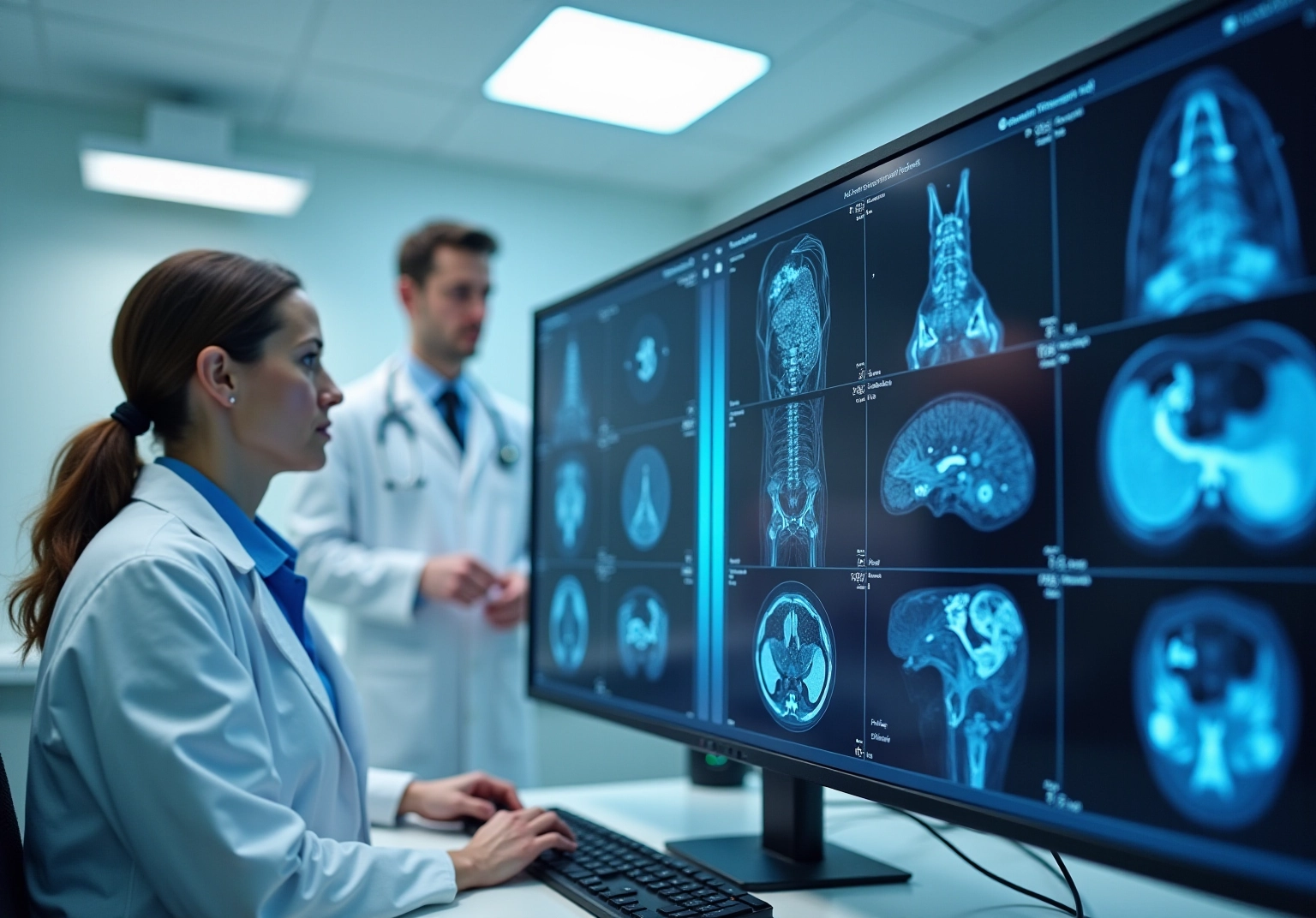
This article delves into ten transformative applications of AI within the healthcare industry, each significantly enhancing patient care. By addressing critical challenges such as diagnostic accuracy and treatment personalization, AI technologies emerge as pivotal solutions. These applications not only streamline administrative tasks but also lead to improved health outcomes, increased efficiency, and heightened patient engagement. The integration of AI is not merely a trend; it represents a fundamental shift in how healthcare providers can deliver superior care.
The healthcare industry stands on the brink of a transformative revolution, driven by the rapid advancements in artificial intelligence. As medical providers face escalating demands and administrative burdens, AI emerges as a formidable ally, streamlining processes and enhancing patient care in unprecedented ways. This article delves into ten innovative applications of AI that not only bolster operational efficiency but also elevate the patient experience. This prompts a critical question: How will these advancements reshape the future of healthcare delivery and patient outcomes?
The Inferscience HCC Assistant addresses a critical challenge in the healthcare sector: the overwhelming administrative burden on medical providers. By leveraging advanced AI in the healthcare industry and natural language processing, this innovative tool automates the collection and analysis of clinical data, delivering real-time coding suggestions directly at the point of care. As a result, it significantly enhances coding accuracy and efficiency.
Moreover, by optimizing Risk Adjustment Factor (RAF) scores, the HCC Assistant empowers healthcare providers to secure improved funding from Medicare Advantage contracts. Organizations that have adopted this solution report a remarkable 40% increase in HCC capture rates, directly maximizing CMS reimbursements. This is not just a statistic; it represents a transformative shift in how healthcare providers can enhance their financial performance.
Additionally, the HCC Assistant integrates seamlessly with EHR systems, consolidating client information to further enhance workflows. This integration illustrates the profound potential of AI in the healthcare industry to improve operational efficiency, allowing providers to focus more on client support rather than administrative duties. Ultimately, this leads to enhanced results and increased satisfaction for both providers and patients alike.
Zebra Medical Vision addresses a critical challenge in healthcare: the need for enhanced diagnostic accuracy in medical imaging. By leveraging advanced AI algorithms, this innovative technology significantly improves diagnostic precision across various specialties. It automatically flags potential findings in scans, empowering radiologists to make more informed decisions.
The incorporation of AI in the healthcare industry, especially in imaging, not only accelerates the diagnostic process but also reduces the likelihood of human error, leading to better outcomes for patients. Remarkably, AI systems have achieved a 94% accuracy rate in diagnosing conditions such as cardiovascular diseases and bone density issues. This statistic underscores the transformative potential of AI in the healthcare industry, particularly in radiology workflows.
As medical providers face increasing demands for imaging services, implementing solutions that utilize AI in the healthcare industry, such as those from Zebra Medical Vision, becomes essential. These advancements not only enhance efficiency but also ensure effective care delivery, positioning healthcare providers to meet the evolving needs of their patients.

IBM Watson Health addresses critical challenges in healthcare by harnessing the power of AI to analyze extensive health data. This capability empowers healthcare providers to devise personalized treatment strategies. By considering genetic, environmental, and lifestyle factors, Watson can recommend tailored therapies that significantly enhance individual outcomes. This innovative methodology not only increases treatment effectiveness but also aligns seamlessly with value-based care models, ensuring providers receive appropriate compensation for delivering high-quality, personalized care.
As AI technology continues to advance, its influence on personalized medicine is set to expand, with projections indicating a remarkable compound annual growth rate (CAGR) of 32% in this sector. These advancements underscore the essential role of AI in revolutionizing medical services and improving user experiences.
Amwell’s AI-driven telehealth solutions address a critical challenge: the accessibility of healthcare services for individuals. By seamlessly integrating virtual consultations, secure messaging, and remote monitoring, Amwell not only enhances the healthcare experience but also ensures timely care delivery. This innovative technology is particularly beneficial for those residing in remote regions, as it effectively diminishes barriers to access and facilitates ongoing health condition monitoring. The outcome? Improved health results for individuals who need it most.

Aidoc’s AI technology transforms radiology workflows by prioritizing critical findings in medical imaging, addressing a pressing challenge in the field. This innovation accelerates the diagnostic process, enabling radiologists to concentrate on urgent cases, which is vital for timely interventions.
By significantly reducing the time required for image assessment—from an average report turnaround of 59.9 minutes to 47.6 minutes for PE-positive examinations—Aidoc enhances the operational efficiency of radiology departments and improves outcomes for patients.
Research indicates that AI-supported worklist management facilitates quicker diagnoses of urgent conditions, thereby optimizing treatment pathways and minimizing delays in intervention.
Given the ongoing staffing shortages in radiology, the integration of AI tools like Aidoc represents a strategic opportunity for healthcare organizations to utilize AI in the healthcare industry to boost efficiency and enhance patient support.

Atomwise is revolutionizing the drug discovery landscape by harnessing the power of artificial intelligence to meticulously analyze complex biological data and predict drug interactions with remarkable accuracy. This cutting-edge technology not only accelerates the research phase but also significantly reduces the costs associated with bringing new drugs to market. By streamlining these processes, Atomwise enhances the speed at which new treatments become accessible, ultimately resulting in more effective support through innovative therapies.
The integration of AI in the healthcare industry is crucial, enabling the identification of potential drug candidates at an unprecedented pace. With AI models capable of analyzing over 10 million compounds daily, this capability accelerates drug development timelines by up to 50%. Atomwise positions itself at the forefront of a rapidly evolving pharmaceutical industry, where efficiency and cost-effectiveness are essential.
Furthermore, Atomwise has achieved an impressive 74% success rate in identifying novel chemical matter, significantly surpassing the historical average success rates for Phase 1 trials, which range from 40-65%. This statistic underscores the effectiveness of Atomwise’s AI-driven approach compared to traditional methods, highlighting the broader implications of AI in the healthcare industry, especially in drug repurposing and its potential to revolutionize the drug development process.
Buoy Health’s AI-driven virtual health assistants are pivotal in addressing the challenge of symptom checking and care navigation. By delivering customized health information and tailored suggestions, these assistants significantly enhance engagement, empowering individuals to take charge of their health. This proactive approach not only improves compliance with treatment plans but also cultivates a more informed population, ultimately leading to superior health outcomes.
The integration of AI in the healthcare industry into client engagement strategies will be essential in developing a more responsive and effective healthcare system by 2025. Furthermore, the seamless integration of virtual health assistants with Electronic Health Records (EHR) boosts their efficiency, facilitating improved tracking and management of individual health.
Healthcare decision-makers should seriously consider adopting virtual health assistants to leverage these advantages. This is evidenced by the positive outcomes from Inferscience’s HCC Assistant, which has increased coding accuracy and reduced administrative burdens through advanced NLP integration, ultimately streamlining risk adjustment processes and maximizing Medicare reimbursements.

WellDoc’s platform, utilizing AI in the healthcare industry, revolutionizes chronic disease management by delivering personalized coaching for conditions such as diabetes and hypertension. By utilizing advanced analytics on individual data, WellDoc customizes recommendations that empower individuals to make informed health choices. This tailored assistance not only enhances health outcomes but also alleviates the burden on healthcare systems by mitigating complications associated with chronic illnesses.
For instance, studies reveal that effective chronic disease management through AI in the healthcare industry can significantly decrease hospitalizations; in fact, AI in the healthcare industry has reduced heart failure hospitalizations by 20% and improved adherence to treatment plans. Notably, 25% of the 33 million patients in the US exhibit poor glycemic control, underscoring the urgent need for effective solutions like WellDoc’s platform.
By emphasizing patient-centric design, WellDoc ensures that its solutions are both accessible and user-friendly, fostering active participation in health management. The integration of AI tools in the healthcare industry has proven to enhance medication adherence rates by over 30%, showcasing the transformative potential of technology in chronic disease care.
Furthermore, WellDoc has secured 11 FDA clearances for diabetes management, bolstering the credibility and efficiency of its platform, while the CE mark certification for BlueStar facilitates growth within the EU, emphasizing WellDoc’s expansion and recognition in the medical technology sector.

Health Catalyst harnesses AI in the healthcare industry through predictive analytics to identify trends and patterns in individual data, which is a critical component for enhancing risk adjustment in the medical field. By integrating advanced NLP tools, healthcare providers can unify client data, streamline HCC coding workflows, and bolster the accuracy of risk adjustment processes.
These NLP tools facilitate automation in data extraction and analysis, significantly reducing manual errors and ensuring timely updates to medical records. This proactive strategy enables early intervention for potential health risks, ultimately enhancing patient outcomes and lowering costs tied to preventable complications.
Furthermore, precise HCC coding is vital for maximizing Medicare Advantage funding, ensuring that providers receive appropriate compensation for delivering effective interventions while aligning with value-based health models.
Notably, predictive AI models in the healthcare industry have demonstrated over 85% accuracy in forecasting chronic conditions, underscoring the transformative potential of AI in the healthcare industry to shift medical services from reactive to preventive approaches.
AI in the healthcare industry is revolutionizing medical services by automating repetitive administrative tasks, including claims processing and appointment scheduling. This optimization significantly reduces the administrative burden on medical personnel, allowing them to focus more on patient care. The shift not only enhances the overall client experience but also leads to improved financial outcomes for providers through better resource allocation.
For example, medical organizations that have embraced AI-driven automation report remarkable time savings, with estimates suggesting a reduction of up to 200,000 hours per day across various administrative functions. Furthermore, case studies demonstrate that AI tools can enhance operational efficiency; Banner Health’s implementation of digital workers, for instance, recovered 1.2 million hours for care.
As AI technology continues to advance, its integration as AI in the healthcare industry is projected to yield over $2 trillion in value, highlighting its essential role in boosting efficiency and improving patient outcomes.

The integration of artificial intelligence within the healthcare industry is fundamentally reshaping patient care, ushering in an era of enhanced efficiency and improved outcomes. By leveraging innovative AI technologies, healthcare providers are streamlining operations while elevating the patient experience to unprecedented levels. This transformation underscores the critical role AI plays in addressing the pressing challenges faced by medical professionals today.
Key advancements in AI applications have been explored, such as:
These innovations exemplify how AI is not merely a technological enhancement but a vital component in the evolution of healthcare delivery.
As the healthcare landscape continues to evolve, embracing AI technologies will be essential for providers aiming to enhance patient care and operational efficiency. The potential benefits of AI in healthcare are immense, promising to reshape patient interactions and streamline clinical processes. By prioritizing the integration of AI solutions, healthcare organizations can not only meet current demands but also set a foundation for a more effective and responsive healthcare system, ultimately leading to better health outcomes for all.